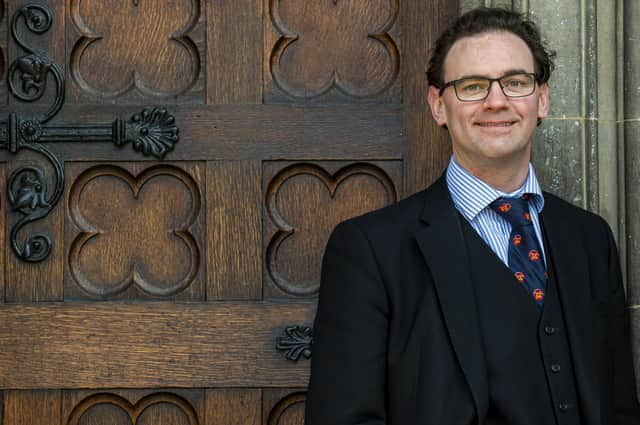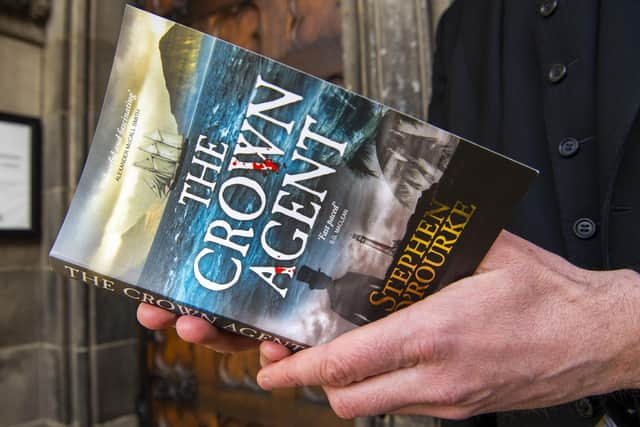The Crown Agent by Stephen O’Rourke, part four: Murder ahoy


‘I’ll need more information,’ I said.
Sir John handed me some papers. ‘Read these before you leave. Then cast them on the fire. But not the money, of course.’
There were half a dozen pages followed by three more pages of some foreign code. There were also five hundred guineas in five guinea notes. Sir John was speaking again, but I was only half listening.
Advertisement
Hide AdAdvertisement
Hide Ad

‘I suggest you write to the Trustees at the Infirmary and tell them you’re heading west for a short while to pursue an interest.
Let’s say...’
‘Marine science?’ I suggested.
From boyhood swims against purple sunsets on the Malabar Coast and the return voyage from India, breathtaking and terrifying, the sea fascinated me.
‘Perfect,’ replied Sir John rubbing his hands. ‘That’ll give you the cover you’ll need. Well time marches on, but two more things before I go. The first is this. You’ll have two points of contact when you arrive in Greenock. Agents whose expertise is local information. Their knowledge of your mission is on a need to know basis, but they’ll contact you when the time comes.’
I frowned. ‘How will I know I can trust them?’
He smiled like a schoolmaster. ‘All my agents have been issued with this codeword.’ He scribbled it on a scrap of paper and showed it to me. Then he rolled it up and flicked it into the fire.
‘Remember it.’
I nodded. ‘And the second thing?’
Advertisement
Hide AdAdvertisement
Hide Ad‘Is this. Greenock is dangerous, Lyon, so I hope you know how to look after yourself. Be on your guard. Trust no-one.’
He drained his brandy and ground out his cigar.
‘Good luck,’ he said, then shook my hand and left.
I sat in a daze staring from the fireplace to the table strewn with cups, glasses and ashtrays, to the papers in my left hand and the banknotes in my right.
I’d never seen so much money.
FOUR
I strode onto Princes Street in the fading afternoon light, waved down a cabby and directed him to Morningside. All I could think about was Sir John’s parting words, and I asked myself how I’d react if I had to fight or turn tail, kill or be killed. I could ride well enough, was a reasonable hand at fencing and could shoot straight and true. But I’d never had to fight for my life at close quarters.
The motion of the carriage jolted my mind back to the pages I’d memorised then burned. The Member of Parliament for Greenock was Sir Guy Stewart, and I was to lodge with him on the recommendation of the Lord Advocate. I was also to present myself to Commander Birkmyre. The information turned to the murdered lighthouse keeper Sandy McLeod, his runaway assistant Tom Hamilton, and the missing Campbeltown Customs Officer, whose name was Crawford McCunn. Sandy’s whole life had been the lighthouse on Cumbrae. He was from the nearby island of Bute, where his father had been gamekeeper to the Marquess. He left a sister and an aunt, both in Rothesay.
Advertisement
Hide AdAdvertisement
Hide AdTom Hamilton was a native of Greenock. He’d been a fisherman, and part owner of a ketch plying the route between Scotland and Ireland. When Tom was bought out by his partner, an Ulsterman by the name of Hugh O’Neill, he decided to enter the lighthouse service and took up his first posting at Oban. From Oban he was transferred to Cumbrae, and he’d been there less than a year when Sandy was killed.
Tom was ‘ five feet eight inches, broad and swarthy with black hair and green eyes.’
Crawford McCunn had followed in his father’s steps and joined the Customs in Campbeltown, where he’d risen to the rank of Officer. He was ‘tall, of slender build with sandy hair and light blue eyes.’
There was more on the Julietta. An examination of the crew had been conducted before their burial. They were only eight in number and were described as either black or Hispanic. Every one of them bore a curious symbol tattooed on their upper left arm in the form of a Double Eagle. Around the base of the symbol ran the legend sine unitate nihil sumus which my College Latin allowed me to translate as ‘without unity we are nothing’. It wasn’t a device I’d come across. I decided when I reached Glasgow I’d visit its university and find out more.
Advertisement
Hide AdAdvertisement
Hide AdOne of the dead was described as ‘a gentleman, dressed elegantly and found in his own furnished room aft, below deck’. He was ‘about six feet, forty or forty-five years, short black hair and beard,’ while his clothes, which had been burned, were ‘colourful, of good cloth.’
A solid gold signet ring the size of a walnut was on the little finger of his left hand. The ring bore the hallmark of Achille Pontellier, a renowned Parisian jeweller, and carried a seal in the same curious form of the Double Eagle, together with the initial ‘M’.
Why was he on board a schooner carrying a simple cargo of sugar?
The pages of foreign code were copied from a journal found in his possession. The original was with Commander Birkmyre. I’d squinted at the pages, turning them this way and that, and had a notion that the words were French or Italian – but it might as well have been Persian for all the sense I could glean. I didn’t burn them, however, because I’d had an idea of my own about what to do with them...
Advertisement
Hide AdAdvertisement
Hide AdTo continue reading, The Crown Agent, by Stephen O’Rourke, is now available in hardback, published by Sandstone Press, £14.99